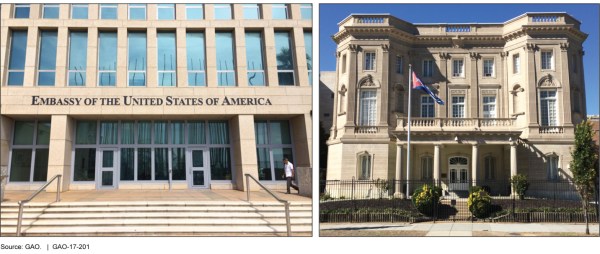By Fulton Armstrong and William M. LeoGrande

On the left, the U.S. Embassy in Havana; on the right, the Cuban Embassy in D.C. / U.S. Government Accountability Office / Flickr / Creative Commons
As the end of Raúl Castro’s presidency approaches, Trump Administration actions halting, if not reversing, the process of normalizing relations with Cuba have tilted debate in Havana in favor of hardliners trying to keep the brakes on economic reform and on constructive relations with Washington.
- In retaliation for alleged “sonic attacks” against U.S. diplomats in Havana, Secretary of State Rex Tillerson’s ordered departure of staff from the U.S. Embassy in Havana, the closure of the U.S. consulate, and the expulsion of Cuban consular and commercial staff in Washington –has put a chill on bilateral relations that ratifies Havana hardliners’ contention that Washington cannot be trusted. By halting the issuance of visas to Cubans in Havana, the Trump Administration will almost certainly violate the 1994 migration accord committing the United States to issue at least 20,000 immigrant visas to Cubans annually. That would rupture the longstanding bipartisan consensus in Washington that bilateral cooperation on migration serves an important U.S. interest in safe and orderly migration.
- The State Department’s unwillingness to share meaningful information on the U.S. diplomats’ mysterious symptoms – underscored by the Embassy’s refusal to use a hotline established for Cuba to investigate alleged attacks real-time – has frustrated pro-normalization Cubans, who face conservatives’ claims that Washington is cynically exploiting the incident to embarrass Cuba and return to a policy of hostility and regime change.
- Other Trump measures reinforce Cuban conservatives’ efforts to limit the growth of the country’s nascent private sector, particularly entrepreneurs who profit from U.S. visitors and need easy travel to import inputs from the United States. A travel warning issued in conjunction with the withdrawal of U.S. diplomats is causing a sharp drop in U.S. travelers, and new regulations abolishing individual people-to-people educational travel are channeling people into large hotels, away from private bed and breakfast rentals. A prohibition on doing business with companies and hotels allegedly linked to the Cuban military is not pushing new clients to cuentapropistas’ businesses but instead is discouraging travel and commerce in general. Cuban reformers are further dispirited by the perception that Washington is shifting back to the erroneous view that it can promote regime collapse by tightening the economic screws on the government, thereby reinforcing a siege mentality among senior leaders and discouraging needed economic reforms as too risky in the current environment.
- Trump’s actions have so closely dovetailed with the agenda of Cuban hardliners that some people speculate it was opponents of reform inside the Cuban government who perpetrated the mysterious “sonic attacks” to provoke a confrontation with Washington. But there is no evidence whatsoever in support of that theory, and for anyone to sabotage Raúl Castro’s opening to Washington – one of the signal achievements of his presidency – would be to commit political (if not literal) suicide.
Implementation of Raúl Castro’s road map for economic change, embodied in the 311 lineamientos approved in 2011 and the Conceptualización of Cuba’s socialist model approved by the Communist Party congress last year, had already slowed before Trump’s sanctions due to Cuban concerns about growing income inequality during a period of poor economic performance, uncertainty about energy imports, and perhaps the 86-year-old president’s own level of energy and state of mind after the passing of his two brothers (Ramón and Fidel both died in 2016). Widely discussed political reforms, such as the Electoral Law and the Law on Associations, that were expected months ago have yet to be unveiled. The Trump Administration’s efforts to expedite regime change by curtailing financial flows to the government and by promoting private sector growth at the expense of state enterprises make it easy for Cuban hardliners to rally support for slowing reforms. Ever since he launched the reform process in 2011, Castro has insisted it would move ahead, “Without haste, but without pause.” Lately, in part because of the Trump Administration’s actions, there’s a lot more “pause” than “haste.”
The election of First Vice President Miguel Díaz-Canel to succeed Raúl as president seems to be a foregone conclusion of the ongoing multi-tiered election process that culminates in February, but no one outside the two men’s inner circle seems to know how or when next steps on reforms will be sequenced. Raúl’s focus has been on creating processes and institutions for governing after he steps down, rather than achieving particular results between now and the formalities confirming Díaz-Canel. One thing that is near-certain, however, is that the successor’s legitimacy will be determined by performance, not his surname or soaring oratory. Tackling the really big reforms that loom ahead, such as currency and exchange rate unification, will require political will from a relatively unified leadership. Cuba has long been adept at dealing with U.S. sanctions and pressure, so Trump’s policies are more an irritant than a threat, but the effect they have in Havana is to slow the implementation of changes that would improve the standard of living of ordinary citizens and to reduce the willingness of Cuba’s leaders to engage with Washington in ways that would serve the interests of both countries.
December 18, 2017
